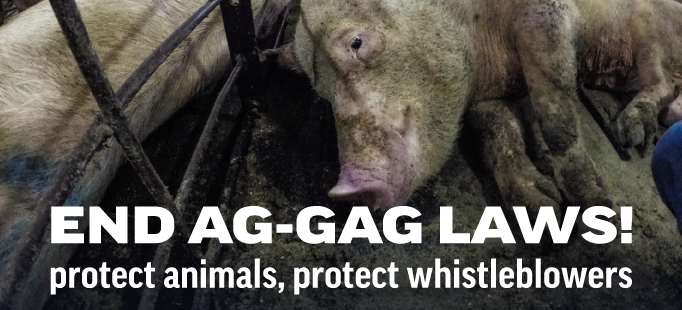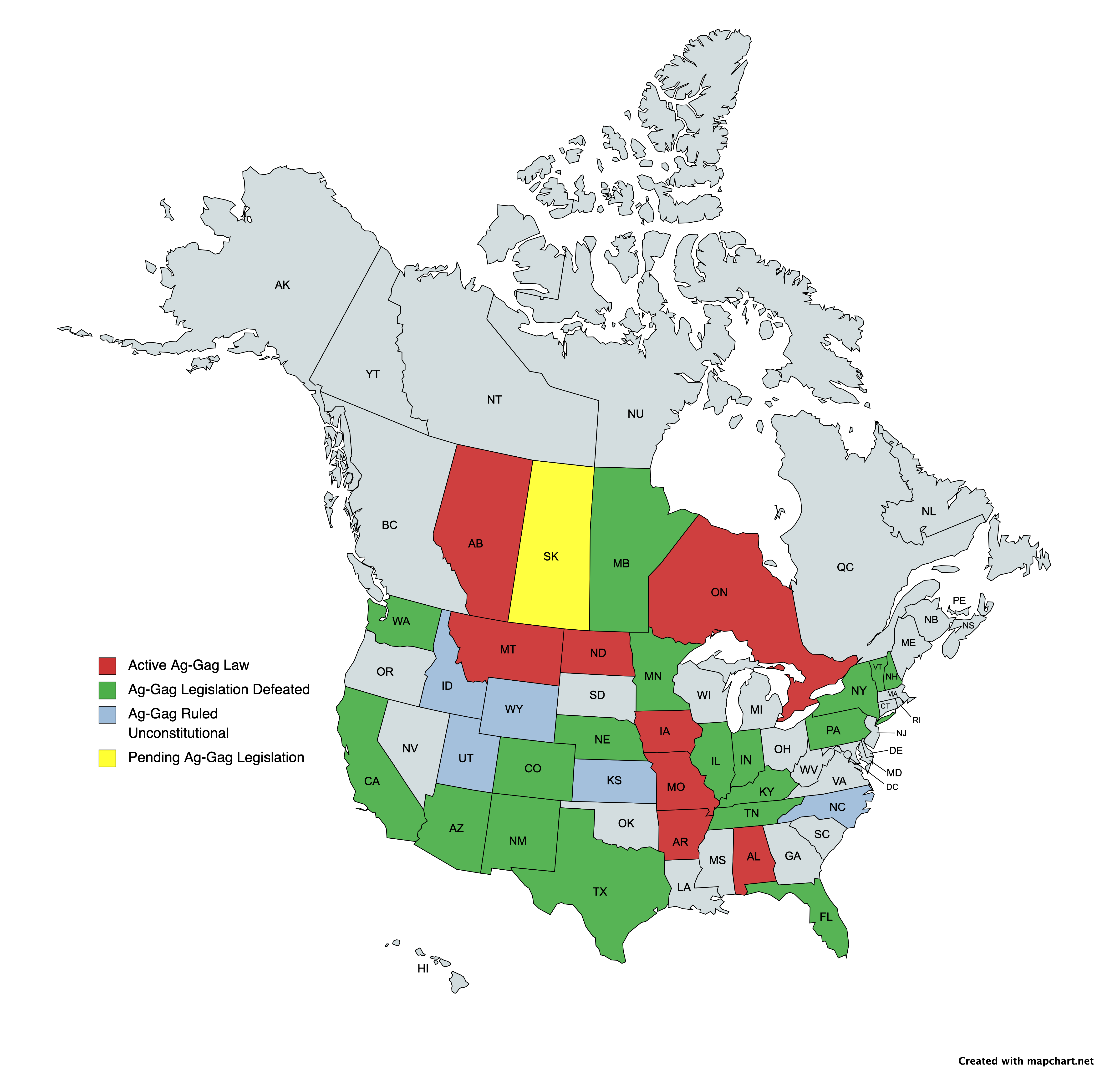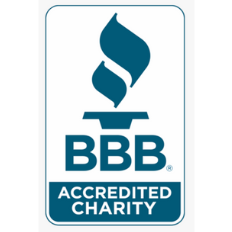VICTORY FOR THE ANIMALS - ONTARIO AG-GAG BILL 156 REPEALED
Ontario, April 2024
A judge ruled Ontario's ag-gag Bill 156, the Security from Trespass and Food Safety Act, violated freedom of expression under the Canadian Charter of Rights and Freedoms and repealed the law. This marks the first time an ag-gag law has been overturned in Canada.
LCA participated in a coalition of groups, led by Animal Justice, working to overturn the law. LCA testified before the Ontario Legislature on the importance of whistleblowing in animal agriculture, the dangers of Bill 156, and highlighted LCA's undercover investigations in Ontario prior to the passage of Bill 156. LCA also proved, through polling, that transparency in agriculture is important to Ontarians. Bill 156, which had passed in 2020, punished whistleblowers who obtain employment under false pretenses with fines up to $25,000.
CANADIAN FEDERAL AG-GAG BILL C-275 - TAKE ACTION
Canada, June 2023
Ag-Gag Bill C-275 is an Act to amend the Health of Animals Act (biosecurity on farms). This federal law could make it an offence for undercover investigators and whistleblowers to enter, without lawful authority or excuse, a place in which animals are kept if doing so could result in the exposure of the animals to a disease or toxic substance that can poison them.
Trespassing and poisoning animals is already illegal in Canada. Disease outbreaks on factory farms have been shown to come largely from improper sanitation procedures.
Under the pretense of biosecurity, Bill C-275 seeks to hide animal abuse issues, human rights violations, and environmental concerns on factory farms.
Whistleblowers could be punished with fines of up to $250,000 and 2 years imprisonment. Nonprofits like LCA could be fined up to $500,000.
On November 29, 2023, the Bill passed the House and was referred to the Senate.
CANADIAN RESIDENTS: SPEAK OUT AGAINST BILL C-275. GO HERE TO EMAIL YOUR MP.
What is Ag-Gag?
"Ag-gag" is short for agricultural gag, and ag-gag laws refer to laws aimed at stopping the flow of information on how animals are treated in animal agriculture. These laws have been sweeping North America; in the U.S., ag-gag laws are being passed at a state level, and in Canada at a provincial level. Ag-gag laws prevent animal advocates, journalists, and employees from revealing truthful information on the conditions faced by animals on farms, in slaughterhouses, and in transit by making it a crime to take photographs or videos of these facilities.
Ag-gag laws were devised and implemented as a direct result of undercover investigations by animal rights groups, such as LCA, revealing cruel conditions. Groups that challenge ag-gag laws include animal and human rights groups, labor unions, and journalist associations. Ag-gag laws are constantly before the courts and changing; court battles are being waged to overturn ag-gag laws under grounds they are unconstitutional and violate Freedom of Speech. For example, the oldest ag-gag law in the United States was passed in Kansas in 1990; this law was overturned in 2020.
LCA is fighting back by monitoring pending ag-gag legislation and campaigning against new ag-gag bills as they arise.
Watch the "Ag-Gag 101" video below to learn more.
Map of Existing Ag-Gag Laws Across North America (Updated December 2021)
List of Existing Ag-Gag Laws Across North America (Updated December 2021)
Canada
REPEALED, Ontario, April 2024 - Ontario's ag-gag Bill 156, Security from Trespass and Food Safety Act was enacted in 2020. It was repealed in 2024 after a judge ruled the bill violated freedom of expression under the Canadian Charter of Rights and Freedoms. Similar to Alberta's ag-gag law of 2019, the law intended to punish whistleblowers who obtain employment under false pretenses with fines up to $25,000.
Saskatchewan, 2021 - Saskatchewan passed Bill 40, The Trespass to Property Amendment Act, 2021 in December 2021. Bill 40 comes into effect on January 1, 2023, and criminalizes whistleblowers collecting evidence of true conditions, without consent from the property owner to do so. The Bill includes fines of up to $200,000, up to 6 months imprisonment and allows for "victims" or whistleblowing to sue for damages for pain and suffering and other losses due to whistleblowing.
Alberta, 2019 - Alberta passed Bill 27, Trespass Statues (Protecting Law Abiding Property Owners) Amendment Act in 2019 and became the first province in Canada to enact an ag-gag law. Bill 27 prohibits whistleblowers from obtaining access to property through false pretenses and is punishable by fines of $10,000 for a first offence and $25,000 for subsequent offences. Groups facilitating whistleblowers could be punished with fines of up to $200,000.
United States
Iowa - Iowa passed its fourth ag-gag bill 716.7A, Damage and Trespass to Property, in 2020. The bill makes it illegal to enter or remain on the property of a "food operation" without consent. The three other ag-gag laws Iowa passed (in 2012, 2019, and 2019) were ruled unconstitutional.
Arkansas, 2017 - Passed HB 1665, An Act to Create a Cause of Action for Unauthorized Access to Another Person's Property; and for Other Purposes in 2017. HB 1665 prohibits employees from making recordings (including images or sounds) without an employer's consent. It also allows employers to sue whistleblowers who uncover crimes.
Missouri, 2012 - State Bill 631, Duty to submit videotape evidence of animal abuse or neglect, was signed into law in 2012. This quick-reporting law mandates that recordings depicting farmed animal abuse or neglect must be submitted to law enforcement within 24 hours of the recording.
Alabama, 2002 - The Farm Animal, Crop, and Research Facilities Protection Act was passed in 2002 and prohibts anyone from possessing records that were obtained by way of deception and accessing property under "false pretenses".
Montana, 1991 - The Farm Animal and Research Facilities Protection Act was passed in 1991 and prohibits the unauthorized entering into an animal facility to take pictures and video of the animals.
North Dakota, 1991 - The Animal Research Facility Damage Act was passed in 1991 and makes it a Class B misdemeanor to enter an animal facility and use or attempt to use a camera, video recorder, or any other video or audio recording device. Violators face a jail term of 30 days.
LCA'S Fight Against Ag-Gag
Ontario, April 2024 - Ag-gag Bill 156, Security from Trespass and Food Safety Act, was repealed because it violated freedom of expression under the Canadian Charter of Rights and Freedoms. This marks the first time an ag-gag law has been overturned in Canada.
LCA participated in a coalition of groups, led by Animal Justice, working to overturn the law. LCA testified before the Ontario Legislature on the importance of whistleblowing in animal agriculture, the dangers of Bill 156, and highlighted LCA's undercover investigations in Ontario prior to the passage of Bill 156. LCA also proved, through polling, that transparency in agriculture is important to Ontarians. Bill 156, which had passed in 2020, punished whistleblowers who obtain employment under false pretenses with fines up to $25,000.
Canada, 2021 - Federal Bill C205 was an amendment to the Health of Animals Act. The bill would have made it an offence to enter, without lawful authority or excuse, a place in which animals are kept if doing so could result in the exposure of the animals to a disease or toxic substance that is capable of affecting or contaminating them. Penalties range from imprisonment of up to 2 years with fines of up to $250,000 for individuals and $500,000 for organizations are imposed. Bill C205 died after a federal election was called in September 2021.
Texas, 2019, 2021 - LCA would like to thank supporters who took the time to write their elected officials opposing HB 1480 / SB 472, legislation that sought to create an ag-gag law in Texas. Although HB1480/SB472 ultimately passed, problematic language that would have made whistleblowing a crime was removed. This isn't the first time Texas tried to pass an ag-gag bill: in 2019, LCA campaigned against Bill SB 1884, which died after not being heard on the house floor.
Manitoba, 2021 - LCA campaigned against Bill 62, the Animal Diseases Amendment Act, which seeks to silence activists by making it illegal to document farmed animals during transport, on farms, and in slaughterhouses. Although Bill 62 ultimately passed, problematic language that would have made whistleblowing a crime was not included in the Bill.
Ontario, 2020 - LCA campaigned heavily against Bill 156, an ag-gag law introduced in 2019. LCA's legal counsel testified before the Ontario Legislature; commissioned a poll that proved transparency in agriculture is important to Ontarians; wrote an op-ed that was published Canada-wide; and held a joint press conference with other animal rights groups to present footage of conditions discovered through undercover investigations into animal agriculture. Unfortuntately, Bill 156 passed in June 2020, but there is work being done to repeal this dangerous law.
Missouri, 2016 - LCA fought Missouri Bill HB 1414, which would have worsened an existing ag-gag bill by creating an "information blackout" for factory farms and puppy mills - blocking the public from learning about animal cruelty, toxic pollution and human health hazards like infectious diseases.
Arkansas, 2015 - LCA successfully defeated Arkansas Bill HB 1774, which would have banned audio recording between anyone in an employment relationship unless all parties consented. After LCA exposed the ag-gag bill via media and a petition, HB 1774 died quietly in committee. Tens of thousands of people signed LCA's petition against HB 1414, and on July 8, 2016, Governor Jay Nixon vetoed this dangerous Bill. Unfortunately, Arkansas passed an ag-gag law in 2017.
How You Can Help
Urge your elected representatives to end ag-gag laws. Let them know the legislation is unconstitutional.
In the U.S., find your state representatives by typing in your home address at www.votesmart.org. They will be located under the State Legislative tab.
In Canada, contact your Member of Provincial Parliament and provincial Minister of Agriculture.













